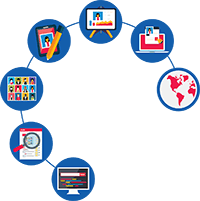- Products

Enjoy a free 30-day trial of our
data validation software.Experience the power of trusted data
solutions today, no credit card required! - Solutions

Enjoy a free 30-day trial of our
data validation software.Experience the power of trusted data
solutions today, no credit card required! - Partners

Enjoy a free 30-day trial of our
data validation software.Experience the power of trusted data
solutions today, no credit card required! - Learn more
- Pricing
- Contact Us
Power to the people: Find out why businesses are democratizing their data

Does your business hope to leverage its data assets to make strategic decisions?
If the answer is “yes,” then you’re in good company. We recently surveyed 1,400 data professionals as part of our 2016 global data management benchmark report, and we found that 98 percent of these companies have a desire to turn their data into insight.
But many businesses are unsuccessful in actually getting it done, due to the vast amount of inaccurate information that lurks in their databases. We found that for 75 percent of respondents, inaccurate data actually undermined their ability to provide an excellent customer experience.
In order for businesses to leverage their information successfully, they need to increase trust in their data by implementing robust governance and data quality programs. While IT is typically the custodians of the business’s data, the ownership of data usually remains under the purview of the originator (frequently business users).
This creates an interesting conundrum, as the people responsible for holding the data are not necessarily the people who are responsible for the quality of the data. And the people who are responsible for the quality of the data don’t always have access to the data when they need it.
In addition, silos between the business and IT can make it difficult for the business to have access to relevant and timely data for strategic decision-making. When time is of the essence, any delay in making an informed decision can cost the business potential revenue. For these reasons and many more, organizations have been transitioning to a democratized data management model, which gives business users access to the organization’s information and requires minimal IT involvement.
Self-service business intelligence is on the rise.
Burdened with old ways of accessing data, many organizations have found an alternative in what’s referred to as self-service business intelligence (SSBI). According to market research firm Gartner, “global revenue in the business intelligence (BI) and analytics market[i] is forecast to reach $16.9 billion in 2016, an increase of 5.2 percent from 2015.”1
SSBI gives business users access to corporate data in a user-friendly, intuitive manner. A self-service program enables business users to evaluate and to analyze data without needing training in data mining, statistical analysis, or business intelligence. With a lower barrier to entry and reduced reliance on IT, data can be leveraged much more quickly by business users for more nimble decision-making.
Organizations are hiring data professionals on the business side.
As the demand for SSBI continues to grow, the need for data roles on the business side is increasing. According to our research, 80 percent of U.S. organizations are hiring individuals into such positions as data analysts, data scientists, and Chief Data Officers (CDOs). Individuals in these positions can leverage corporate data to build analytical models and algorithms to improve the way decisions are made.
In addition, because these business users bring their own subject matter expertise to the table, they will have a complete understanding of how the data is ultimately going to be used, enabling them to determine whether the data they have is fit for purpose or not.
Data governance is still important.
Now, the idea of handing the reins entirely to business users can be a scary proposition for IT professionals. After all, any accidental or erroneous changes to the source data can wreak havoc across the organization.
In order to make it a win-win for both teams, we recommend developing a robust data governance program. While our research indicates that 77 percent of U.S. respondents believe that the responsibility for data quality should ultimately lie with the business (with occasional support from IT), we recommend that the governance of data remain under a centralized owner, such as a CDO, as they can serve as a bridge between the business and IT.
In addition, it’s possible to give business users access to the data with role-based permissions in a hypothesis environment. This way they can distil insight from the organization’s information with minimal risk to the source data. Remember, data governance is a critical component of your business strategy, so it’s necessary to recognize that it should be a permanent program within your organization. You should constantly be evaluating your processes to ensure that they fit in with your business culture, and the technologies you use should be reviewed regularly, as well, to make sure they are meeting the demands of your business.
Want to learn more about democratizing your data? Check out our white paper.
1. Gartner, Inc. 2016. Gartner Says Worldwide Business Intelligence and Analytics Market to Reach $16.9 Billion in 2016. http://www.gartner.com/newsroom/id/3198917. Accessed on August 8, 2016.
[i] The business intelligence and analytics market includes analytic applications, BI platforms, CPM suites, advanced analytics and performance management software.

